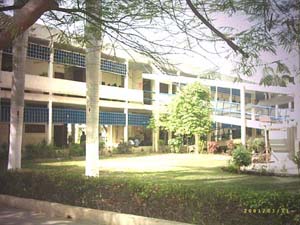ABOUT PHYSICS DEPARTMENT
The Department of Physics was established in 1952 in the old city of Karachi. It was later shifted to the present campus of University of Karachi (total area 1,279 acres) in the year 1959. It is one of the leading Department in science and technology in Pakistan. The total area of the Department of Physics is 64,118 square feet with covered area of 34,000 square feet. It houses a seminar library, a mechanical workshop, nine classrooms, a store a liquid nitrogen laboratory, teachers offices and an auditorium with a capacity of 450 persons. The Department consists of three major buildings, a laboratory wing, an L-shaped office and classroom wing and an auditorium. The Department thus provides condusive atmosphere for both teaching and research.
To start with the year 1952, there were only three teaching staff members, namely Prof. Dr. Syed Mujtaba Karim (late), Dr. Syed Masoom Ali Tirmizi and Dr. S. Abid Husain (late). First admission of the Department of Physics in M.Sc (Previous) was started in September, 1953. After six months, B.Sc. (Honours) program was added. Dr. Syed Mujtaba Karim (late), Dr. Syed Bande Hasan Abidi (late) and Dr. Syed Masoom Ali Tirmizi started the first batch of the Department in an old School building which was located at Princeton Street, Karachi. Dr. Syed Mujtaba Karim (late) was the founder Chairman.
Since its establishment, the Department has been offering various degree programs on several advanced level subjects. The Department has a good numbers of academic staff having Ph.D. degrees in Materials Science, Electronics, Microelectronics, Optoelectronics, Industrial Electronics, Electronics and Communication, Nuclear Physics, Solid State Physics, Space, Liquid Crystal Physics and Spectroscopy. The members of the faculty are highly qualified with long experience of teaching and research in their respective fields of specialization. The academic staff of the Department also provides its expertise to various engineering and technological organizations on request. The graduate and post-graduate teaching and research laboratories are well equipped with latest equipment. The Higher Education Commission (H.E.C.) is acknowledged for a grant, through Physics Department PC-1 Project, for upgrading of teaching and research facilities of the Department. The degrees offered by the Department are considered to be of international standards with good reputation. Graduate and postgraduate level students are being employed by industries, corporate sector, academic institutions in Pakistan and overseas.
In addition to students with Physics major, Department of Physics offers minor / subsidiary courses of B.S. / B.Sc. (Honours) for students of various Departments of the university such as Mathematics, Geology, Geography, Chemistry, Statistics, Economics, Applied Chemistry, Food Science & Technology and Chemical Engineering & Technology Department.
The Department has produced many brilliant physicists who have served or have been serving in various national and international institutes and research organizations. The mission of the Department of Physics is to produce Graduates / Masters of international caliber with knowledge and skills needed for the socio-economic development of the country. The Department also provides an environment and infrastructure for optimum utilization of potential of faculty, staff and students.
The Department of Physics is a teaching / research Department of the University of Karachi. It offers courses leading to B.S. (4 years), B.Sc. (Honours), M.Sc., M.Phil. and Ph.D. degrees. The Department also has a program for Masters degree in Physics with specialization in Communication and Electronics.
The Department in the recent years has launched a strong experimental research program in a number of areas of physics. The Department places an emphasis on colloquia and seminars in which, apart from the faculty, participation from the research students is encouraged. Scientists and experts from various organizations and institutions outside the university are also invited to deliver lectures. The faculty members and research students get opportunities to attend the national and international conferences. In addition, the Department itself organizes national conferences, regional workshops and symposia.
